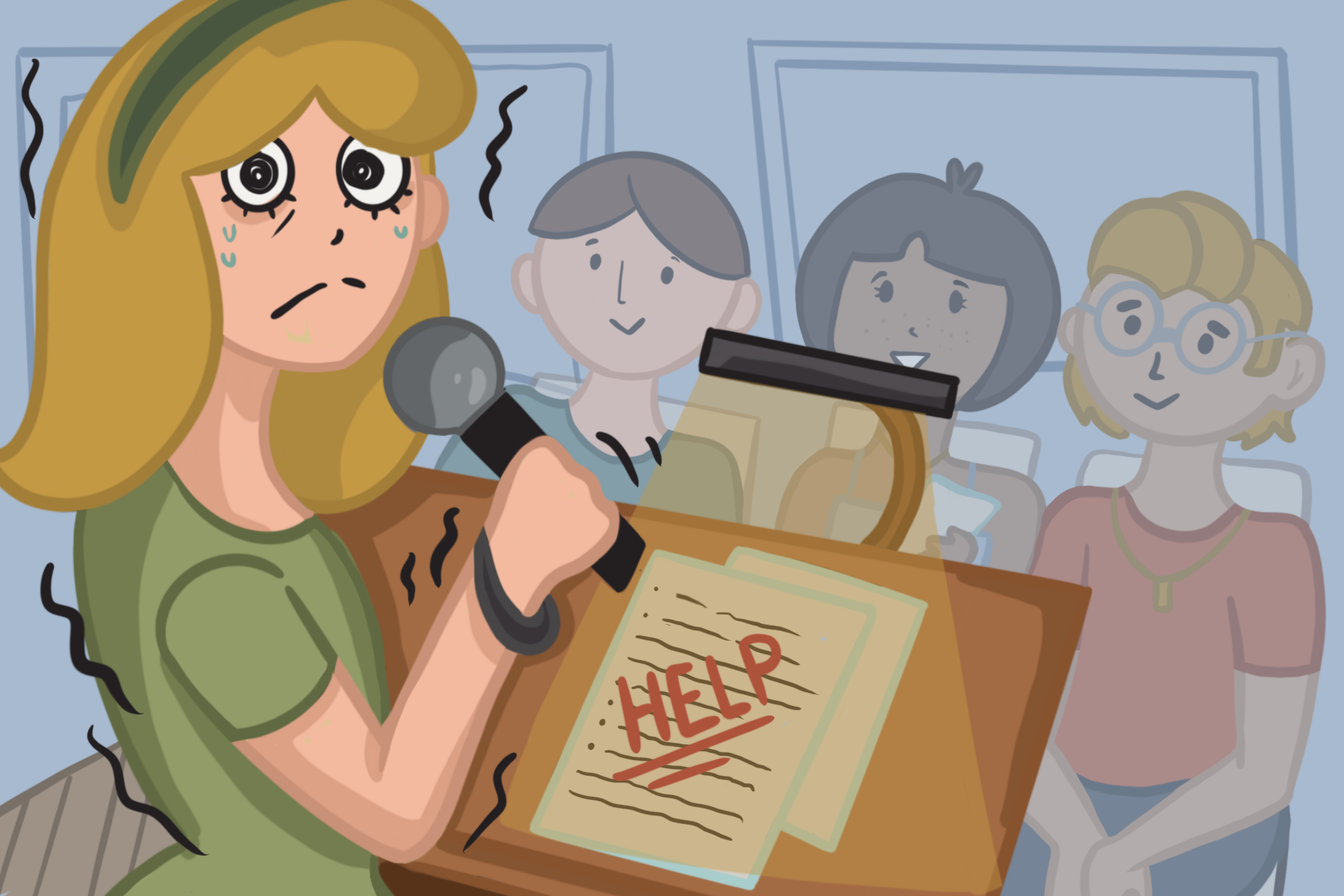Hands in pockets, trembling legs, dry mouth, body stiffness, shortness of breath – these are just some of the manifestations of nerves, which strengthen as soon as we head in front of the crowd to talk about something. Nervousness seeks ways to reveal itself externally, making public speaking one of the worst situations we can experience.
In different periods of our lives, we commonly feel terrible anxiety about standing in front of people to present a topic at school or work. However, the truth hurts, and not developing this skill hinders crucial moments in people’s lives. Some students have declared that they have skipped class to avoid speaking publicly, which in the end, has negative consequences, such as getting low grades or missing out on opportunities. Likewise, they may not accept positions with more responsibility or promote their ideas at the workplace due to fear of presenting themselves in front of a crowd.
Public speaking is a powerful tool, allowing a person to address a group of people to communicate a message to inform, entertain, or persuade. Being in front of an audience and knowing how to function as a speaker catches and captivates an audience, impacting them to make them feel inspired, motivated, and even influenced.
Knowing how to communicate in front of a crowd is an essential skill to grow as a leader. “Having a good idea or recognizing an opportunity is one thing. Being able to explain it to a team, answer questions about it, defend it, motivate others to act on it – may actually be more important,” says Nwanacho Nwana, co-founder of the educational app Valfee for Forbes.
It is common to think that public speaking is a natural skill and that if you are an introverted person or not born with it, you will never be able to do it. However, like any skill, the learning process is different for every person, and the only thing required is continuous practice and the willingness to receive feedback for improvement.
What do I gain from public speaking?
Expressing yourself in front of an audience improves your intrapersonal communication. Additionally, it helps develop other abilities that benefit personal development. The bitter pill of speaking for 10 to 30 minutes in front of an audience is little suffering compared to the valuable rewards acquired when this practice is regular in people’s lives:
- Increases self-confidence: At the end of a presentation, you can feel the satisfaction of finally being over with it, but this is even greater when you improve the areas that were lacking. The confidence gained is reflected in your posture, voice tone, and mood, which helps the stage fright disappear over time.
- Strengthens communication with others: Knowing how to voice your thoughts helps you express yourself better, and others will understand you easily.
- Develops active listening: Although it may not look like it, active listening plays an important role. While it’s essential to follow a structure during your presentation, you should tune into your audience in the following ways: understanding and answering their questions, making eye contact, sensing their attitude, and encouraging their participation if possible.
- Knowledge is power: Researching your topic to the maximum is vital when presenting, so your research skills would be significantly boosted.
- Encourages critical thinking: Speakers must respond quickly on the spot. Unexpected questions or challenges will almost always come up, so improvising quickly with concise answers is another skill that can be harnessed.
- Opens doors to new opportunities: Nowadays, knowing how to express yourself effectively is a skill that many companies value, regardless of the area of specialization, because it reflects your knowledge and self-confidence.
Tips for future speakers
All these benefits sound good, don’t they? While it is easier said than done, it never hurts to remember the words of journalist Malcolm Gladwell: “Practice isn’t the thing you do once you’re good. It’s the thing you do that makes you good.” The first few times you practice conscientiously will not be so easy, so keep in mind these recommendations to alleviate what can be a nightmare for many:
Take a deep breath: Before starting the presentation, take a few minutes to breathe deeply a few times. It will calm your nerves and clear your mind.
Use visual aids: As the name implies, visual aids are just that: aids or support. If you do not enjoy reading slides full of information with very long statements and bland graphics, consider that your audience will like it even less. Use large, easy-to-see images, titles, and small sentences to support your narrative. Make them illustrative reference points to navigate through the structure of the presentation.
Arrive early: Arrive in advance to familiarize yourself with the space where you will give your presentation; it will ease your nerves. You will have time to know the presentation area and equipment functioning, prepare your materials properly, and anticipate any mishap.
Think positively: We can be our own worst enemy. Before going on stage, if you believe that everything will go wrong and let negative thoughts carry you away, you will attract these unfortunate events because you are mentalized for them to happen.
Pauses are your friends: We mistakenly think we should know what to say immediately on stage. Sometimes, when we forget what to say, time seems to pass very slowly, and we believe we are standing without saying anything for five long minutes. But the reality is that taking your time, speaking slowly, and pausing after pointing out some information can have a positive impact and make the presentation go smoothly, with no rushes. Don’t be afraid to take a few seconds to gather your thoughts; if you are very nervous, take a small deep breath.
Accept that it’s okay to be wrong: Despite being well-prepared and knowledgeable about the topic of our presentation, situations may occur where we do not know something. Making a mistake or not knowing the answer to a question is normal, and accepting that we do not know something is much more preferable than providing false information or pretending. Admitting that we don’t know can be positive. In addition to being honest with the public, your connection with them increases and encourages dialogue and participation.
Focus on yourself!
While these tips work for many people, they may not be ideal for everyone. The best way to improve your skills is to take all possible opportunities to speak in public and reflect after each session on what areas to improve.
Another way to get better is with the help of peers and colleagues, who can have very different perspectives from yours. Being external, they can notice things that you weren’t aware of. Thus, it is vital to be open to feedback on an ongoing basis and, above all, not to take any constructive criticism personally; instead, consider their suggestions on how to improve future presentations.
All the knowledge in the world does not guarantee a good presentation. We can have the best tools and prepare ourselves to the maximum, but nerves can steal the show. That is why it is not enough to rely solely on your research or the structure of your presentation; we must pay attention to how we transmit the message, reaffirm our confidence in ourselves, and stay positive. Public speaking is an art that brings together different disciplines. Do not feel discouraged if you think you are not good; gather friends or colleagues to hear you practice and consider their feedback. As time passes, you will see that you can polish your skills and become a great speaker.
Translation by Daniel Wetta
This article from Observatory of the Institute for the Future of Education may be shared under the terms of the license CC BY-NC-SA 4.0 
)
)


)